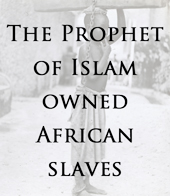TheReligionofPeace
|
|
TROP is a non-political, fact-based site which examines
the ideological threat that Islam poses to human dignity and freedom
|
|
|
Jihad Report
Feb 21, 2026 -
Feb 27, 2026
|
| Attacks |
31
|
| Killed |
151
|
| Injured |
81
|
| Suicide Blasts |
2
|
| Countries |
10
|
|

|
Jihad Report
February, 2026
|
| Attacks |
115
|
| Killed |
748
|
| Injured |
510
|
| Suicide Blasts |
4
|
| Countries |
19
|
|
List of Attacks
|
|
|
It's much easier to act as if critics of Islam have a problem with Muslims as people than
it is to accept the uncomfortable truth that Islam is different
|
|
|
|

|

|
|
|

What can we learn about
Islam from this woman?
|
|
|
|





